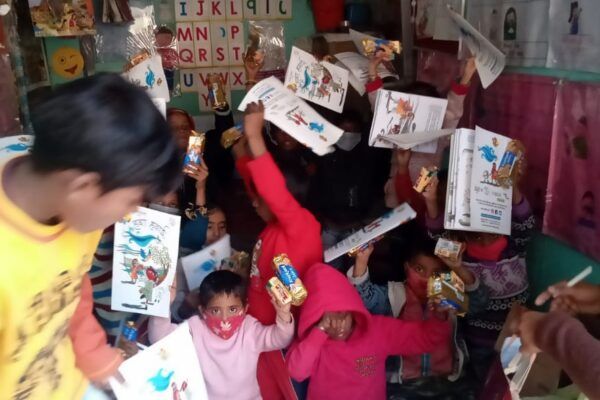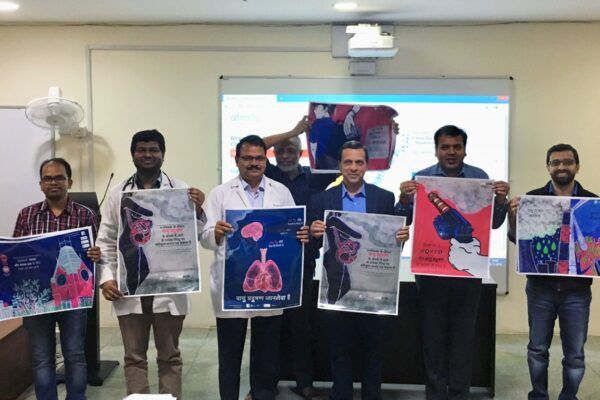The problem
Construction is the second largest sector by employment in India after agriculture, with 49% of the industry’s workers being women. 94% of female construction workers avoid talking about air pollution out of fear of losing their job. On building sites, the combination of dust, plant machinery and transport leave construction workers particularly vulnerable to dangerous levels of air pollution. Many workers suffer from stress, depression, loss of memory and diseases like silicosis, yet they fail to recognise air pollution as a contributing factor.
With site engineers ‘six times more exposed’ to air pollution than the average office worker, construction workers bear the brunt of the burden. Government bans on construction work during the peak polluting months prevented women from earning a living. Despite posing significant risks to their health and finances, female construction workers remain largely unrepresented in public debates around clean air.
The solution
Mahila Housing Trust (MHT) and Help Delhi Breathe (HDB) worked with communities and construction workers across the resettlement colonies of Bakkarwala, Gokulpuri, and Sawda Ghevra in Delhi (India) to drive awareness of air pollution as a health issue for construction workers. Residents of these colonies are marginalized due to several contributing factors such as lack of legal ownership over their homes, poverty and lack of regular work and access to protection.
MHT intervened at the individual, community and local government levels. The programme developed female construction workers’ knowledge of air pollution, while engaging with local governments and policy makers to support policy actions. Through training, community outreach and stakeholder engagement, MHT equipped female construction workers with the tools, profile and agency to make life-improving changes and make their voices heard in the clean air discourse.
1. Equipping women to advocate for clean air
MHT trained more than 75 female construction workers to develop a scientific understanding of air pollution and its causes. They learned how to use and generate actionable insights from air quality index (AQI) devices. Of the women trained on the use of devices, 5 construction workers acted as AQI ambassadors or ‘master trainers’ to train their peers on the devices and share knowledge.
Equipped with portable AQI devices, the women could report on air pollution levels in their local area and share tangible proof of the dangerous levels of air pollution they were experiencing. These women also learned how to use the ‘Green Delhi’ App, an application that allows citizens to report instances of pollution to the Delhi government.
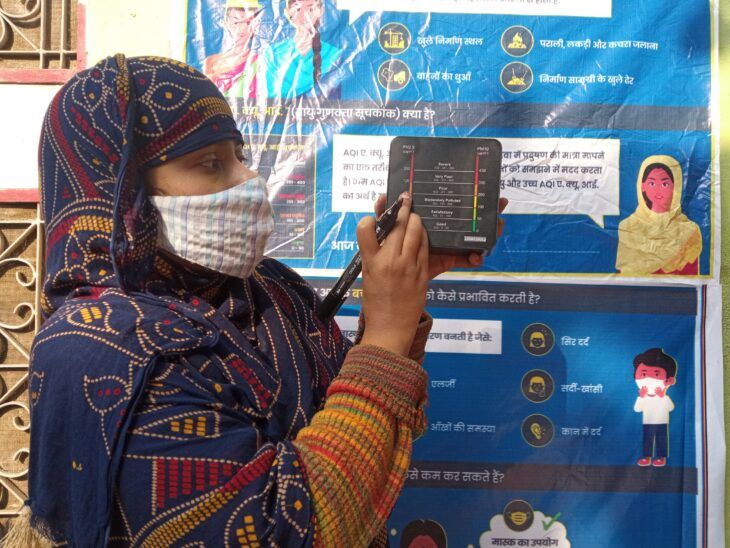
2. Raising awareness in local communities
To drive local awareness of air pollution, AQI ambassadors visited communities with AQI monitors to measure local levels of air pollution. Men, women and children gathered to learn and talk about the sources of air pollution around them and alternative ways to mitigate the risks. Construction workers adopted simple adaptation measures at their work sites such as wearing masks, sprinkling water to prevent dust from resuspending and ensuring that their young children stayed away. The ambassadors’ outreach also drew the attention of local businesses. Through consistent engagement with the Municipal Corporation of Delhi (MCD), the ambassadors ensured that waste was collected regularly from their neighbourhoods, thereby significantly reducing the incidence of open waste burning.
To enhance public awareness, Help Delhi Breathe aimed to reach a wider audience in the community through online and offline media. They used varied communication and storytelling tools, such as street plays, e-rickshaw drives, sensitisation roundtables, and additionally, young artists from National Institute of Design created murals in each location that brought to the forefront women workers, their issues in childcare and air pollution to raise awareness among the community and helped amplify the onground work.
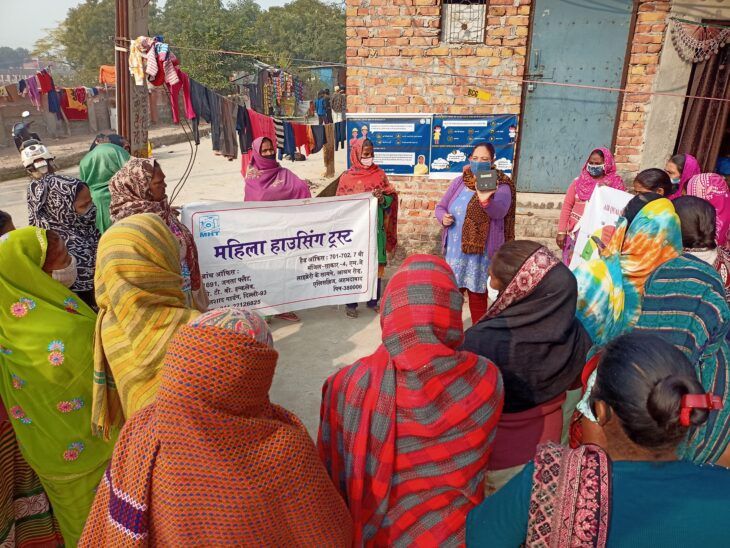
17 women from the construction workers community were trained on using mobile phones to improve their communication and storytelling skills. Following the training, two videos were made to capture the work that the AQI Ambassadors are doing in their communities.
Further campaign activities included:
- Decorating e-rickshaws with posters about AQI levels in local communities. The team handed out over 6,000 informative pamphlets and reached over 20,000 people.
- Displaying large scale wall murals and street art depicting women in the construction industry, the impacts of air pollution on health and finances, and the lack of support for childcare.
- Hosting and recording street plays to explore local causes of air pollution and solutions.
- Organising four roundtables and workshops with media, organisations working on clean air, and groups working with construction and other informal workers.
- Distributing 50,000 pamphlets across the city in partnership with the Delhi Building and Other Construction Workers Welfare Board
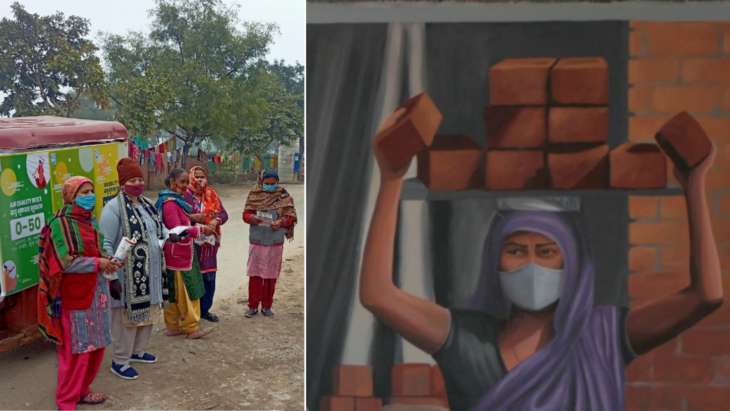
3. Engaging with government for real change
To complement the public campaigning, MHT engaged with local government and other key stakeholders to encourage a shift in policy, including the Labour Department, the Municipal Corporation of Delhi (MCD), the Delhi Urban Shelter Improvement Board, and the Central Pollution Control Board. MHT met with three members of legislative assemblies (MLAs) over the course of the project. The organisation also built partnerships with government officials and representatives, including those from the Delhi Government’s city-wide clean air campaign, Yudh Pradhushan ke Virudh (Youth against pollution).
4. Raising awareness in the larger ecosystem
With the aim of increasing awareness and representation of informal sector concerns amongst civil society groups, media and the broader ecosystem, four roundtables and workshops were organised by Help Delhi Breathe, with representation from local and national media houses, CSOs working on clean air, and groups working with construction and other informal workers.
The impact
The joint efforts of MHT and HDB successfully managed to raise awareness on air pollution among the women construction workers and across sectors. Over 1,700 women downloaded the Green Delhi app, leading to 12 complaints being filed and resolved across multiple construction sites.
Ms Reena Gupta, Advisor to the Delhi Government, committed to providing health camps for construction workers, and the Delhi government has since launched the ‘Doctors on wheels’ scheme to support mobile health camps at construction sites.
Over 470 construction workers were supported by MHT to access financial compensation of INR 5000 from the Delhi government due to bans on construction work during the peak polluting months. Social security schemes like this can’t by accessed by unregistered construction workers without a valid labour card, so MHT partnered with the Delhi Construction Workers Welfare Board to register workers in Gokulpur and they received a letter of appreciation for their contribution.
